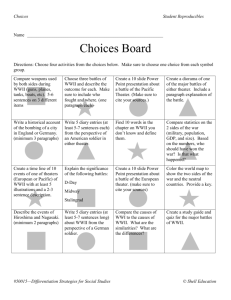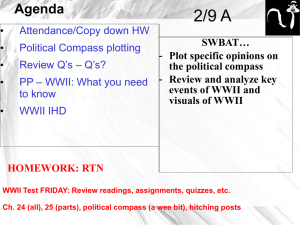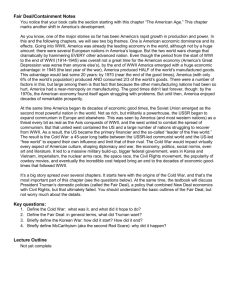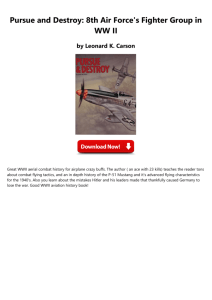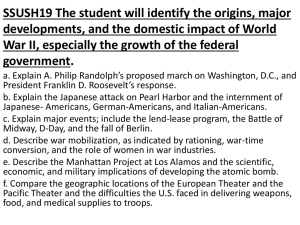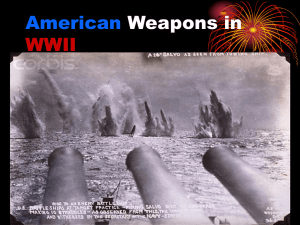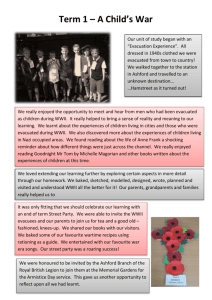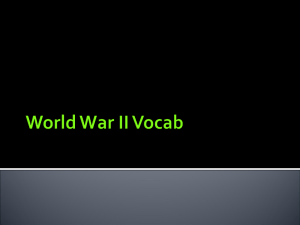World War II-Tiered Instruction
advertisement
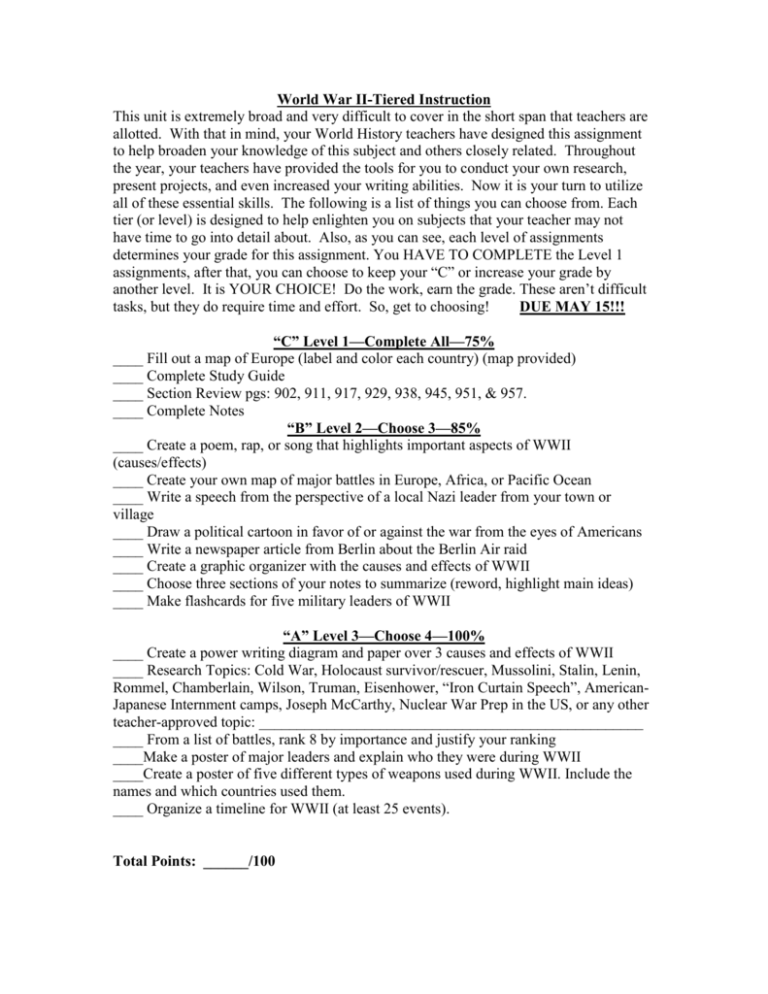
World War II-Tiered Instruction This unit is extremely broad and very difficult to cover in the short span that teachers are allotted. With that in mind, your World History teachers have designed this assignment to help broaden your knowledge of this subject and others closely related. Throughout the year, your teachers have provided the tools for you to conduct your own research, present projects, and even increased your writing abilities. Now it is your turn to utilize all of these essential skills. The following is a list of things you can choose from. Each tier (or level) is designed to help enlighten you on subjects that your teacher may not have time to go into detail about. Also, as you can see, each level of assignments determines your grade for this assignment. You HAVE TO COMPLETE the Level 1 assignments, after that, you can choose to keep your “C” or increase your grade by another level. It is YOUR CHOICE! Do the work, earn the grade. These aren’t difficult tasks, but they do require time and effort. So, get to choosing! DUE MAY 15!!! “C” Level 1—Complete All—75% ____ Fill out a map of Europe (label and color each country) (map provided) ____ Complete Study Guide ____ Section Review pgs: 902, 911, 917, 929, 938, 945, 951, & 957. ____ Complete Notes “B” Level 2—Choose 3—85% ____ Create a poem, rap, or song that highlights important aspects of WWII (causes/effects) ____ Create your own map of major battles in Europe, Africa, or Pacific Ocean ____ Write a speech from the perspective of a local Nazi leader from your town or village ____ Draw a political cartoon in favor of or against the war from the eyes of Americans ____ Write a newspaper article from Berlin about the Berlin Air raid ____ Create a graphic organizer with the causes and effects of WWII ____ Choose three sections of your notes to summarize (reword, highlight main ideas) ____ Make flashcards for five military leaders of WWII “A” Level 3—Choose 4—100% ____ Create a power writing diagram and paper over 3 causes and effects of WWII ____ Research Topics: Cold War, Holocaust survivor/rescuer, Mussolini, Stalin, Lenin, Rommel, Chamberlain, Wilson, Truman, Eisenhower, “Iron Curtain Speech”, AmericanJapanese Internment camps, Joseph McCarthy, Nuclear War Prep in the US, or any other teacher-approved topic: ___________________________________________________ ____ From a list of battles, rank 8 by importance and justify your ranking ____Make a poster of major leaders and explain who they were during WWII ____Create a poster of five different types of weapons used during WWII. Include the names and which countries used them. ____ Organize a timeline for WWII (at least 25 events). Total Points: ______/100 Directions Section Review Directions: For all vocab (#1s) define the term and use it in a sentence. If the question asks about a chart, diagram, table, or previous work, ignore that part and simply answer the question provided. Be sure to answer ALL parts of a question, some contain several questions. Poem/Rap/Song Directions: Be sure to include events, people, places, causes and/or effects. Be creative. Don’t use derogatory or slang terms. Be sure its school appropriate. Check with a teacher if you’re unsure. Put music behind your song or rap. Record it and post it on youtube.com (optional)! Get others involved: flash-mob! Make a slide-show out of it and put appropriate-related pictures with it! Battle-sites Map: Get a blank European or Pacific Ocean map from the teacher. Then you be creative and color, label, and key your map with major battle sites. Look through your textbook for ideas. . .DO NOT COPY YOUR BOOK MAPS! Nazi Speech: What would you say if you were a Nazi? Would you report on the war? Would you ask for recruits for the army? Would you ask for recruits for Hitler Youth? How would you get your town involved in the war? Since you are a dedicated Nazi, and a loyal nationalist, how would you express the need for your town to take up the same cause as you? Be specific in your writing. What do you want from your town and why? Make this a one-page speech. Newspaper Article: If you were living in Berlin as a news reporter, what would you have experienced? Write a detailed article (2 columns, 1 page) about the air attack on Berlin. Create your article using excitement, flamboyance, and urgency in your writing. Use a thesaurus if you need a wider vocabulary. Come up with a creative title! Google some articles from this era. . .DO NOT COPY! US Political Cartoon: As an American, are you for or against the war? This is pre-Pearl Harbor. Our government was debating on entering the war before Pearl Harbor. We decided to stay out of it. If you were a congressman debating the topic, what would you have said? Would you say to get involved? Why or why not? Draw this in a cartoon form. Google political cartoons from WWII for more ideas! Again, DO NOT COPY! Causes and Effects Graphic Organizer: Your teacher can provide you with several choices of graphic organizers for this project. Choose an organizer that you think would best show causes and effects of the war. Be sure there is a clear connection between each cause and effect you choose. Use your notes and book for this assignment. Include at least three of each, more would be better! Also, write a brief description/explanation of each cause and effect. Military Leader Flashcards: On the front of each card, write the leaders name and find a picture of him and paste it on the card. On the back include where they are from, major battles they helped lead, significance of his position as a military leader, and what happened to him after the war. Five flashcards total. Power Writing Diagram & Paper: As we’ve done before, use a diagram to map out which three causes and effects you’ll focus on (if you do the graphic organizer in the previous tier, you can use that as your diagram). Next, begin your paper with a strong introduction paragraph outlining the war and your three C/E. Then, include three paragraphs for each C/E. Finally, conclude with a strong conclusion paragraph. It can restate some of the intro paragraph but include your opinion on why you chose those three C/E. 8 Battles: Your teacher has a list of 15 major battles from WWII. You’ll need to choose 8 to rank 1-8. Also, you’ll need to justify why you picked and ranked each one. Why did you think it deserved the number eight spot or why it deserved the number one spot? Posters: Posters need to include pictures, explanations, and of course, sources. If you chose the military leaders, then paste a picture of the leader with a short synopsis of the leader’s role during WWII. (If you chose the flashcards from tier 2, that info will suffice.) If you chose weaponry, then include pictures of each weapon, full description, and which country used it during the war. Make your poster look organized and attractive (similar to our Renaissance posters). Timeline: Your timeline may consist of several pages. You can make this on the computer or draw it by hand. Add photos of your top 25 events, and of course don’t forget to site your photos. There were hundreds of events throughout WWII. Check through your notes and book for some ideas. Research & Written Reports: If you choose to write a report on a person or subject, you need to include the following: -Who, what, where, when, why, and how (answer as many as possible) -Reference Page: internet, book, or person (where did you get your info) -Typed or Neatly written and 1.5 pages unless stated otherwise -Intro and conclusion paragraphs, along with your info (body) paragraphs -Clear, concise paragraphs—they need to flow and make sense -If you’re writing about a person, you may use their first and last name together, or their last name by itself. ie: Smith created the power writing tool for his students to use. OR John Smith was the creator of the power writing assignment. Summary: If you choose to write a summary, be sure it’s just that, a summary. Summaries include the main ideas of a topic, a brief explanation, and usually one source (your textbook or notes). Be sure that you’re REWORDING these points. Do NOT Restate. There is a difference. For example, if I were to reword these instructions, it may look like this: According to Mrs. Hutton’s instructions on summarizing, one should not simply restate the facts provided, but reword them so that the reader will understand the main points. The reader may also recognize that the information wasn’t plagiarized but simply summarized. Map: http://cacgrade8laandhistory.pbworks.com/f/Europe+1924+RGB+Blank.jpg Southeast Asia: http://mobiledevmag.com/wp-content/uploads/folder/blank-south-asia-map-1.jpg Africa map: http://www.uvm.edu/~inquiryb/webquest/sp09/lstacey/BlankAfricaMap.jpg Major WWII Battles: Tarawa (Pacific) Okinawa (Pacific) Midway (Pacific) Guadalcanal (Pacific) Pearl Harbor (USA) Iwo Jima (Pacific) D-Day (France) Bulge (Belgium/Luxemburg) Operation Market Garden (Netherlands) Stalingrad (Russia) Leningrad (Russia) Berlin (Germany) Sicily (Italy) El Alamein (Africa) Monte Casino (Africa) Cause/Effect GO-1 Topic: Cause Effect Cause/Effect GO-2 Causes Topic: Effects Cause/Effect GO-3 Topic:
